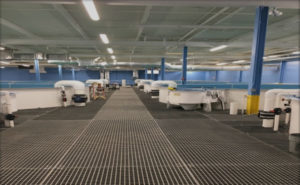Aquaculture Can Revitalize Old Industrial Communities
Editor’s note: The following is a guest blog post by chef, author and seafood advocate Barton Seaver. GAA and Seaver announced a partnership in early 2018 to raise public awareness of responsible aquaculture and the importance of sourcing seafood with provenance.
In my last post, I wrote about how aquaculture brings economic and educational opportunity to rural areas of the developing world where it didn’t exist before. I’d be remiss, then, not to shed some light on how aquaculture is beginning to bring new and exciting work to industrial communities that have watched good jobs vanish, commercial tax bases dry up and children leave town to pursue interesting careers.
In its brief life as a commercial enterprise, aquaculture has proven to be one of the leading growth sectors of the global food system. According to numbers tracked by the Organization for Economic Co-operation and Development, since the 1980s world aquaculture has increased from 7 percent of global fisheries production to over 46% today. It is expected to hit almost 50 percent by 2023. Farming all of that fish and distributing it to eaters across the globe requires farmers, yes, but also scientists, architects, sales teams, engineers, logistics experts, processors and transportation professionals. These are the same types of jobs that used to drive local economies when paper mills, coal mines and steel plants were thriving. Those communities are ripe for aquaculture development because they have the industrial infrastructure, educated workforce and a documented heritage of work ethic to help drive the budding aquaculture industry.

For example, in my home state of Maine, in just the last six months, two companies have announced their plans to develop state-of-the-art recirculating aquaculture system facilities that will generate those types of jobs. Whole Oceans is renovating an old paper mill in Bucksport and expects to employ more than 200 workers within two years, with more hires coming in the future when the company adds a feed mill and starts more labor-intensive processing operations. Nordic Aquafarms’ brand new facility in Belfast will create 60 jobs by 2020 and up to 140 jobs total once it’s completed.
Bringing these employment opportunities into already industrialized communities not only expands the geographical footprint of the aquaculture industry, but it also supports a growing diversity of demographics by providing very attractive career paths for younger generations. Growth is a magnet for more opportunity. Rising generations are evermore considerate of how their professions impact the planet and its people and, culturally, aquaculture is a feel-good industry in that regard. New farming techniques and their tailored regional applications give young professionals the opportunity to advance in their careers within the communities in which they are rooted. And in turn, those communities are revitalized.




